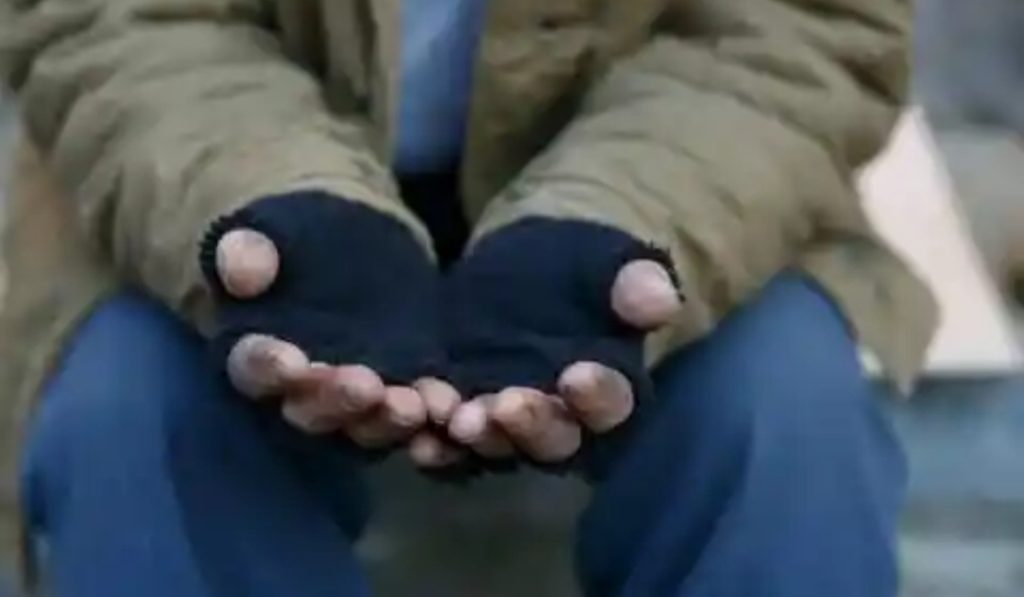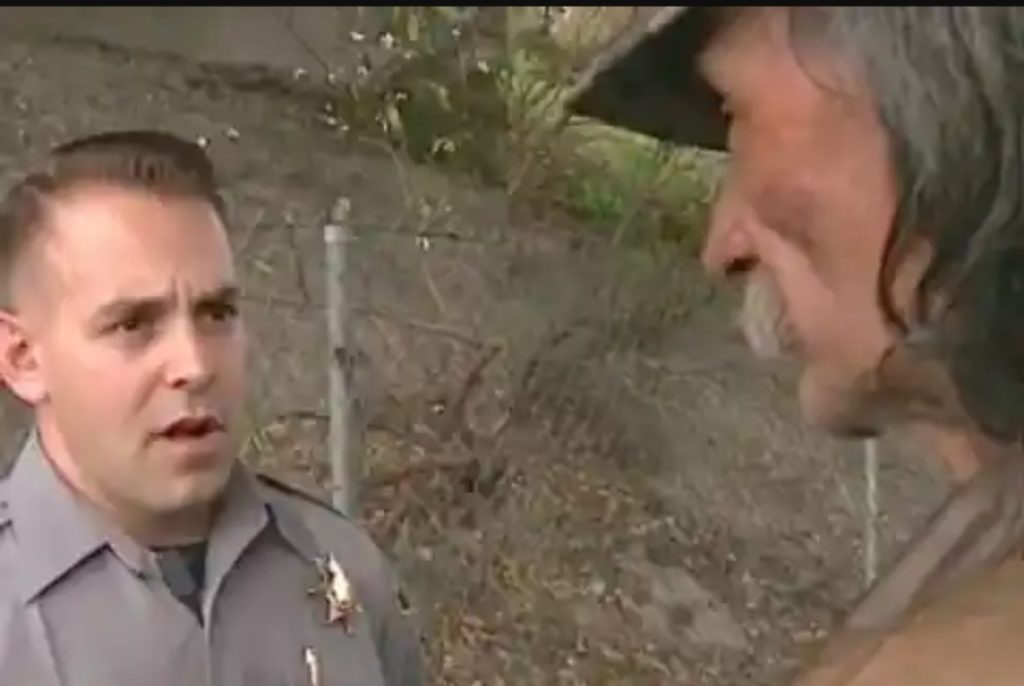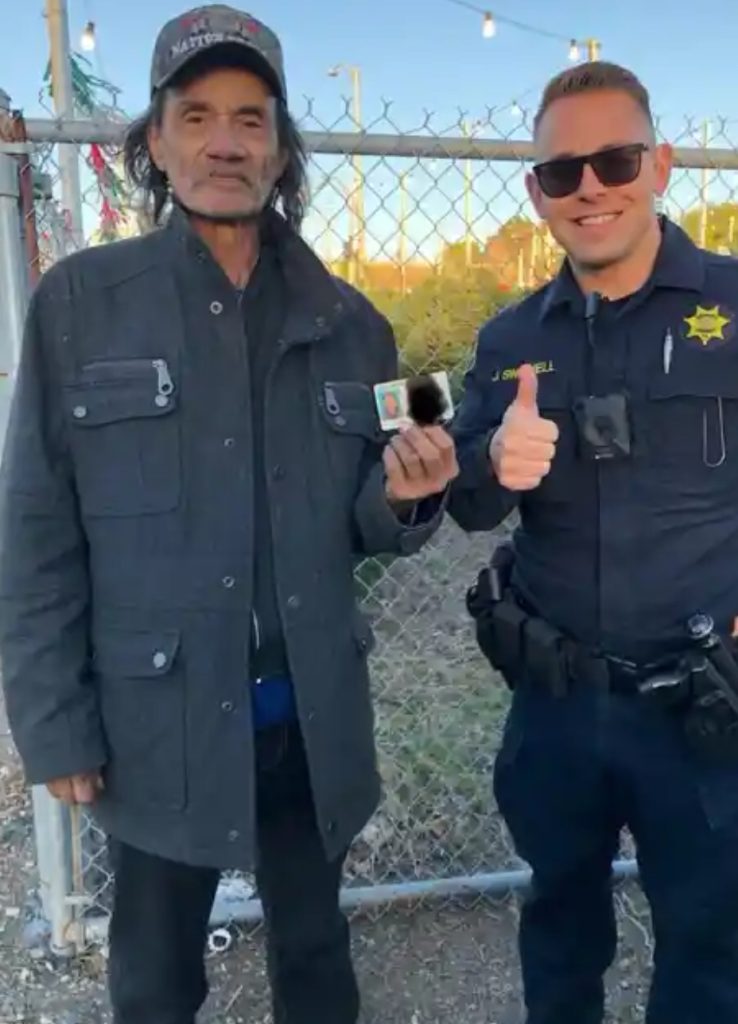After 30 Years On The Streets, This Homeless Man Discovered His True Identity Thanks To A Police Officer

For over 30 years, Mick Myers lived on the streets of California struggling to survive. Weary and haggard from the bright and burning sun, Myers soon found himself having run-ins with the law in Alameda County due to his panhandling. However, he risked his safety and his freedom in order to make enough money to fill his belly on a daily basis
When on sheriff decided to issue Myers a citation, neither men had any idea it would be the beginning of a life-changing journey for them. One filled with heartache, facing the past and finding one’s true identity.
This story is sure to warm your heart.
Mick Myers didn’t start out on the wrong side of the tracks. In fact, when he was an infant he was adopted by a loving family in San Leandro, California. Growing up he was easy-going, loved playing in the marching band, and had a nice group of friends.
Unfortunately, things at home were less than stellar.
While Myers’ adoptive parents tried to make him feel like he was part of the family, not everyone was happy to have him around. His mother tried to be affectionate, but his siblings rejected him.
Despite his best efforts, his adoptive siblings ignored him completely. Eventually, Myers began to cut himself off from his friends and the outside world, becoming a quiet introvert. He often felt isolated and alone, and according to Myers, this feeling followed him into his adulthood.
As Myers got older, he lost contact with his friends and described life as “living life as alone as a person could possibly be.” His relationship with his family fell apart when he found out he was adopted at the age of 16. While this explained why his siblings were distant, it didn’t help the situation.

Myers’ adoptive parents suddenly passed away. After their deaths, his siblings who never liked him to begin shut him out entirely. Realizing he was never really family to them, Myers cut all ties and went out on his own. Now, he would have to survive alone and try to make a life for himself.
With no ties to anyone, Myers ended up taking a job as a truck driver. It was the perfect job for a loner like him. He enjoyed getting lost in his thoughts while on the open road. However, it only furthered his social isolation.

Unfortunately, the open road eventually took a toll on Myers’ mental state. He ended up losing his job and with no other source of income, he lost everything. Before long, Myers was living on the streets with no one to turn to.
Myers would spend the next 30 years living on the streets of San Leandro, California. He would play his guitar and panhandle in an effort to make enough money for a hot meal. Sadly, the locals didn’t take kindly to him and he found himself passed by most of the time.

Begging for money didn’t bring in enough cash to live off of. As months on the streets turned to years, homelessness became the new normal for Myers. Hope soon diminished, and Myers believed he would live and die on the streets without a roof over his head.
Thankfully, fate had other plans.
Deputy Sheriff Jacob Swalwell had encountered Myers panhandling in Alameda County on more than one occasion. He had warned him about begging people for money while trying to show him a kindness the rest of the public seemed to neglect.
Unfortunately, Myers did not heed Swalwell’s warnings. He noticed that despite warning him multiple times, Myers continued to beg for money in town. Swalwell knew his options were running out, and it was time to give Myers a final warning.

Believing he had to make things official, Swalwell decided to file a formal citation. He asked Myers for his ID and was informed that he didn’t have one. “I had given him so many warnings, and I asked him for his ID and he said he didn’t have an ID. And I immediately asked, ‘Why don’t you have an ID?’”
Swalwell and Myers soon began to converse about his life. The sheriff soon learned that Myers wasn’t some criminal vagrant trying to cause trouble. He didn’t have an addiction nor was he homeless because of a vice. He was simply a man who had lost his family and had been given no direction in his life.
“I learned more, that he was disabled and had been homeless for 30 years. He was not an alcoholic, he did not use drugs, he did not use tobacco. He was just a senior citizen on his own,” Swalwell told CBS news.
Swalwell wanted to help him, but what options were there for Myers?
Since Myers didn’t have a home, he was unable to collect social security or any type of benefits. In order to receive any assistance, he needed an ID. Thankfully, luck was on Myers side and his situation was about to change drastically.
Swalwell couldn’t help but be touched by Myers story. He realized he needed to help this man and was willing to put in the work needed to getting him an ID. Even if it was only the first step to get him off the streets, it would be more than worth it.
Unfortunately, getting an ID would prove easier said than done.
Most of us can attest to the fact that the DMV is no picnic. The lines are long and as Myers would soon discover, obtaining an ID is a lot more complicated than it sounds. Almost immediately Swalwell and Myers hit a roadblock.

Despite having a driver’s license when he was a truck driver, the DMV had no record of Myers in their system. The clerk informed the men that to obtain a new ID he would have to submit a large stack of paperwork. Sadly, most of the documentation Myers wouldn’t be able to produce, for example, proof of residency.
However, Swalwell was not going to give up that easily.
Myers found himself quickly losing hope. He was used to being met with adversity in his life. Why should this situation be any different? Thankfully, Swalwell was there to encourage him and not let him admit defeat.
Realizing he needed more help, Swalwell enlisted the help of his personal pastor. They needed to track down all of the documents Myers needed for his proof of residence. Together, they set out to make it happen.
Swalwell worked tirelessly to track down Myers’ birth certificate. It took some digging, but he eventually found it. The certificate even had the name he was given by his birth parents: Gordon Michael Oakley.
With the documentation ready, Myers could finally get the ID he needed.

After what seemed impossible, Myers finally obtained his personal identification. Soon the news would catch wind of his story and featured him as a local feature. They were amazed by Swalwell’s kindness. “We both realized at the same time that there is a real person there and not just the stereotype we saw when we first met each other,” Myers told reporters




